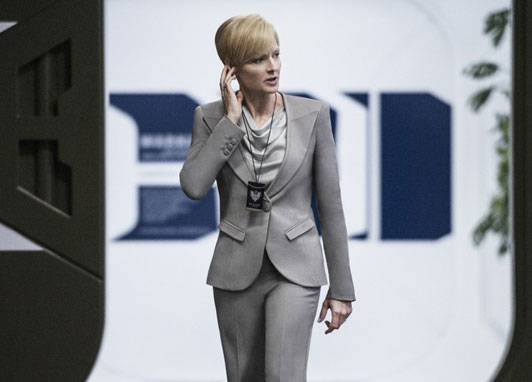Remember the 99%? Hollywood does, sort of. Two very different studio releases – “Elysium” (which opens today) and “Paranoia” (opens August 16) – revisit the oh-so-2011 issue of economic and political inequality, and explore the possibility of returning power to the people..
But first of all, what is it with these big-name, presumably fully-coiffed actors playing it bald in their latest movies? Harrison Ford in “Paranoia”
and Matt Damon in “Elysium”
both sport the skin-head look. Just wondering, but in addition to this superficial similarity (or is it so superficial?), the two films have a lot in common.
In the tradition of movie dystopias going back to Fritz Lang’s “Metropolis” (1927) and even H.G. Wells’s novel “The Time Machine” (1895) – or, more recently, the ambitious but silly 2012 allegory “Upside Down” – the world in Neill Blomkamp’s “Elysium” has taken the upstairs/downstairs arrangement to extremes.
In the year 2154, the planet has gone to pot, poisoned by pollution, wracked by crime, poverty and disease, and monitored by a brutal police force of Robocop-like automata.
But if you’re one of the lucky few to be a citizen of the title space station, an orbiting Garden of Eden featuring unlimited luxury, eternal youth, with piped-in classical Muzak and unflattering, monotone pant suits,
who cares? But the surface does provide the parasitic Elysium with the raw materials and labor that keeps the good life going, and there’s also the pesky problem of shuttle-borne illegals sneaking in through the tight security, so Elysium’s Secretary Delacourt (Jodie Foster with an inexplicable, affected, plummy accent) keeps herself busy maintaining draconian order.
Meanwhile, back on earth in a future LA
that makes the city in “Blade Runner” look like Beverly Hills (actually, it’s a CGI-souped-up Mexico City; as is also evident in his “District 9,” if there’s one thing Blomkamp is good at, it’s futuristic grubbiness and squalor), lumpen laborer Max (a bald Matt Damon) is enjoying the fruits of over a century of government deregulation and is working in a factory under subhuman conditions. In an ironic touch, he works at an assembly line building the same robotic police robots that had broken his arm in a preceding scene. But an accident irradiates hum lethally, and he’s told he has six days to live, is given some pills, and is sent home.
Now one of the big draws of Elysium is that citizens have access to a device that can heal everything (it looks like a tanning bed); the place combines Obamacare with the miracle cures of Lourdes. So in order to save his life, Max must somehow gain entry into Elysium and get into one of the healing machines. This involves working with the quasi-revolutionary human trafficker Spider (a hyped-up Wagner Morra) who has him fitted with a mechanical exo-skeleton that combines the power of Iron Man’s armor with the excruciatingly application suffered by Wolverine for his adamantium implants.
It turns out a bad guy has the same outfit, and the last hour of the movie consists of the kind of rock-em, sock-em action seen in about a dozen films this summer.
So by the end I don’t think too many people will be pondering the future of class conflict, nor will the filmmakers after raking in an estimated $35 million opening weekend box office.
A more down-to-earth version of the same scenario, “Paranoia,” adapted by Robert Luketic from Joseph Finder’s 2004 novel, investigates solutions to economic disparity that are less drastic than crashing space shuttles into utopian real estate or blowing people to smithereens (another of Blomkamp’s talents – graphic displays of the effect explosives have on the human body).
At an Apple-like corporation, the loathsome mogul Nicholas Wyatt (Gary Oldman at his malice-oozing best) cans a bunch of 20-something employees after Adam Cassidy (Liam Helmsworth), their spokesperson, gets mouthy at a pitch session. Pissed off that his generation has been disenfranchise dfrom the American Dream by a bunch of old fogies , Adam does something indiscreet, gets caught, and is extorted by Wyatt into infiltrating his rival Jock Goddard’s (a bald Harrison Ford) company and stealing their secrets.
So instead of donning a pumped up exoskeleton and taking a shuttle to the promised land, Adam puts on an Armani power suit and drives a Porsche, infiltrates the inner circle of power, gets a taste of it, and faces some tough moral – and political – choices while sampling fine wine and the charms of his thoroughbred co-worker, Emma Jennings (Amber Heard).
Among those films that “Paranoia” probably will be compared to (in addition to “Elysium,” though I think that I am, so far, alone in that). Oliver Stone’s “Wall Street” (1987) offers some of the more interesting parallels. Indeed, when I recently interviewed Finder, the author of the book, he said that he had deliberately imitated elements of that film, but with key changes.
In particular, the father: in “Wall Street” the aspiring financial buccaneer played by Charlie Sheen has a broken-down working class dad (played by Martin Sheen) who is a font of wisdom and moral clarity. In Finder’s book, however, Adam’s broken down working class father is a total prick, an abusive monster dying of emphysema. You want to hand Adam a pillow and say, “Do it quickly.”
But in the movie, dad is again the font of wisdom, advising Adam about the right thing to do, and let’s say it doesn’t involve armed rebellion against the oppressive ruling class.
Which brings up another difference between the book and the movie, a change that may be attributed to the economic turmoil of the years since the book’s publication in 2004, in particular the financial meltdown and the abortive Occupy movement. Finder’s Adam is a cynical loner out to help himself. In the movie, though, he represents a generation of young people who want access to the same rewards of the system as their stingy elders. In other words, the system is fine, as long as we get included in it, too.
That’s my take, anyway. I’m still working on what the deal is with the bald guys.
–Peter Keough







